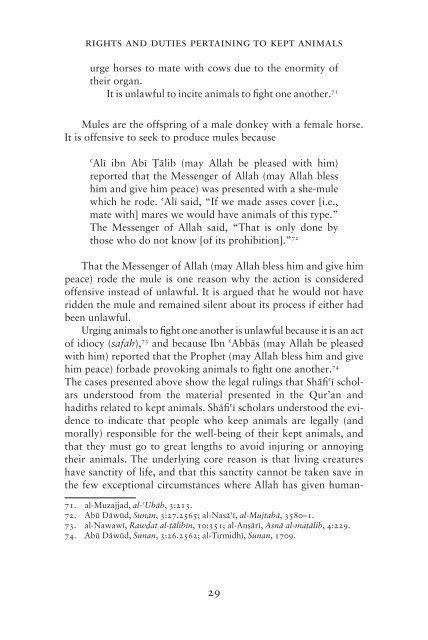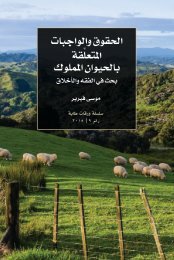Rights and Duties Pertaining to Kept Animals
1RcDQG8
1RcDQG8
You also want an ePaper? Increase the reach of your titles
YUMPU automatically turns print PDFs into web optimized ePapers that Google loves.
<strong>Rights</strong> <strong>and</strong> duties pertaining <strong>to</strong> kept animals<br />
urge horses <strong>to</strong> mate with cows due <strong>to</strong> the enormity of<br />
their organ.<br />
It is unlawful <strong>to</strong> incite animals <strong>to</strong> fight one another. 71<br />
Mules are the offspring of a male donkey with a female horse.<br />
It is offensive <strong>to</strong> seek <strong>to</strong> produce mules because<br />
ʿAlī ibn Abī Ṭālib (may Allah be pleased with him)<br />
reported that the Messenger of Allah (may Allah bless<br />
him <strong>and</strong> give him peace) was presented with a she-mule<br />
which he rode. ʿAlī said, “If we made asses cover [i.e.,<br />
mate with] mares we would have animals of this type.”<br />
The Messenger of Allah said, “That is only done by<br />
those who do not know [of its prohibition].” 72<br />
That the Messenger of Allah (may Allah bless him <strong>and</strong> give him<br />
peace) rode the mule is one reason why the action is considered<br />
offensive instead of unlawful. It is argued that he would not have<br />
ridden the mule <strong>and</strong> remained silent about its process if either had<br />
been unlawful.<br />
Urging animals <strong>to</strong> fight one another is unlawful because it is an act<br />
of idiocy (safah), 73 <strong>and</strong> because Ibn ʿAbbās (may Allah be pleased<br />
with him) reported that the Prophet (may Allah bless him <strong>and</strong> give<br />
him peace) forbade provoking animals <strong>to</strong> fight one another. 74<br />
The cases presented above show the legal rulings that Shāfiʿī scholars<br />
unders<strong>to</strong>od from the material presented in the Qur’an <strong>and</strong><br />
hadiths related <strong>to</strong> kept animals. Shāfiʿī scholars unders<strong>to</strong>od the evidence<br />
<strong>to</strong> indicate that people who keep animals are legally (<strong>and</strong><br />
morally) responsible for the well-being of their kept animals, <strong>and</strong><br />
that they must go <strong>to</strong> great lengths <strong>to</strong> avoid injuring or annoying<br />
their animals. The underlying core reason is that living creatures<br />
have sanctity of life, <strong>and</strong> that this sanctity cannot be taken save in<br />
the few exceptional circumstances where Allah has given human-<br />
71. al-Muzajjad, al-ʿUbāb, 3:213.<br />
72. Abū Dāwūd, Sunan, 3:27.2565; al-Nasāʾī, al-Mujtabā, 3580–1.<br />
73. al-Nawawī, Rawḍat al-ṭālibīn, 10:351; al-Anṣārī, Asnā al-maṭālib, 4:229.<br />
74. Abū Dāwūd, Sunan, 3:26.2562; al-Tirmidhī, Sunan, 1709.<br />
29



